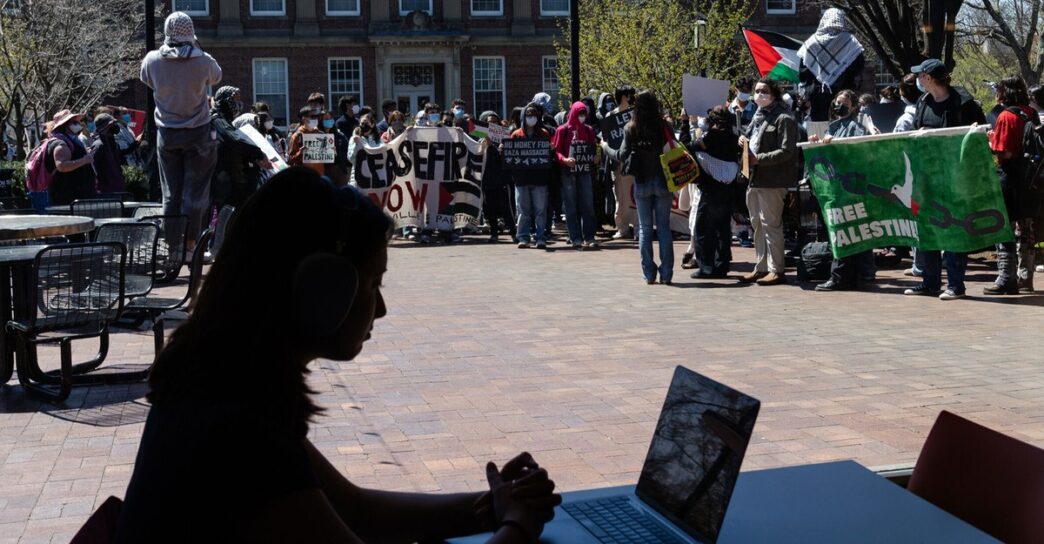One day this fall, while on campus at Brown University, I was met by two students—cellphones raised, cameras recording. They had spun off from a larger group protesting Brown’s decision not to divest from Israel. They recognized me as a trustee of the university and saw an opportunity to take me to task. They followed me for perhaps a block or two, calling me a hypocrite.
For at least one of the students, the war in Gaza was not some cause du jour that he’d picked up from TikTok. He has Palestinian relatives on the ground. I knew this because I’d spoken with him before. That time, he was passionate but measured. Now, in protest mode, he was angry. I’m sure he felt betrayed by the decision, and I was one of the only people he could hold—at least verbally—accountable.
Understandably, some of my colleagues who were singled out by protesters were more rattled by the experience. But in my view, these were students in America doing what students in America should do: questioning authority (in this case, me) and using their rights to free speech and free assembly to engage with issues they are passionate about.
That is not to say I didn’t find this period of campus unrest unpleasant or this particular incident annoying. No one likes to be called a hypocrite and accused of being indifferent to human suffering. And certainly no one wants to be shouted at. But I never for a moment felt that these students were a threat to me, let alone to America’s national security.
And yet, that is the justification the United States government is offering for its decision to revoke the visas and green cards of international students who have spoken out against the war in Gaza.
When I read about the detention of Rümeysa Öztürk, the first thing I thought is that she must have been very hungry. The Tufts University doctoral student had been fasting since dawn when a group of hooded and masked plainclothes officers surrounded her near her home in Somerville, Massachusetts. I imagine that the friends who were planning to host her for iftar that evening were merrily preparing their table, oblivious that Öztürk had been seized in the street, handcuffed like a criminal, and put inside the back of an unmarked car in what looked, to passersby, like “a kidnapping.” Perhaps, when Öztürk didn’t respond to their texts, the friends—all hungry themselves—began without her. Their concern must have curdled into fear as the night wore on.
Öztürk’s friends and colleagues were shocked when they learned what had happened. They must have known, of course, about the detentions of students at other universities that began in early March with the seizure of Mahmoud Khalil from his New York City apartment. Khalil, a recent Columbia University graduate and a green-card holder born in a refugee enclave in Syria, was a pro-Palestinian activist and one of the organizers of a march where some attendees praised Hamas. Although the Trump administration has not accused Khalil of any crime, it has portrayed him as a radical terrorist.
But Öztürk was different. “The only thing I know of that Rümeysa’s organized,” one of her friends told reporters, “was a Thanksgiving potluck.” No one seemed more stunned than Öztürk herself, who was chatting on the phone with her mother when the officers swarmed.
Undocumented immigrants are used to living in fear of ICE knocking on their door. But Öztürk is not undocumented. She is one of the roughly 1 million international students studying in the United States this academic year. She came from Turkey at the invitation of an American university, an invitation made possible by the State Department through the student-visa program. As long as Öztürk stayed out of legal trouble (which she had) and remained enrolled in school full-time (which she had), she had no reason to expect that she could be removed from the life she had been building here.
Öztürk was apparently detained because she co-wrote an op-ed for The Tufts Daily last year. When a reporter asked Secretary of State Marco Rubio why Öztürk’s visa was revoked, he replied that if a student applying for a visa said up front “that the reason you’re coming is not just because you want to write op-eds but because you want to participate in movements that are involved in doing things like vandalizing universities, harassing students, taking over buildings, creating a ruckus, we’re not going to give you a visa.” If a student took part in “that sort of activity” once here, he said, the government has the “right to remove you.” He added, “We’re looking every day for these lunatics.”
No one has alleged that Öztürk vandalized or took over any buildings. Did the op-ed create a ruckus? It urged the administration to take more seriously a vote from the student senate calling on the university to divest from Israel. In the context of the Israel-Palestine discourse of spring 2024, the op-ed is civility at its finest. In the context of op-eds, it is a snooze.
Rubio has been leaning on a Cold War–era law that he says allows him to personally revoke green cards and visas. The law refers to immigrants whose presence in this country the government has “reasonable grounds” to believe could “have potentially serious adverse foreign policy consequences for the United States.” A former head of America’s Immigration Lawyers Association pointed out that this provision of the law has not been applied since 1997.
Welcome to Donald Trump’s America, where the Cabinet texting about war plans on a nongovernmental messaging app is “not a big deal,” but an op-ed in a school paper is a threat to national security.
Rubio says he has signed off on deporting or revoking the visas of 300 or more people, an unknown portion of whom are student activists. Some have been snatched from their home or the sidewalks outside. Others, such as Rasha Alawieh, a medical-school professor at Brown whose H1-B visa was sponsored by the university, have been turned away at the airport. In at least a few cases, more than a day went by before anyone figured out where the disappeared students had been taken.
Rubio’s interpretation of the law is just one more example of the Trump administration’s attempts to change America from a nation of rights to a nation of privileges that can at any moment be revoked. “We gave you a visa to come study and get a degree,” Rubio said about the students, “not to become a social activist that tears up our university campuses.”
Green cards may be a privilege, but once they reach American soil, these students also have rights—to speak freely, to peacefully convene, to enjoy due process under the law. Those rights don’t depend on citizenship status; they are embedded in the founding of this country. The students do not, as Rubio correctly points out, have the right to “tear up” campuses. But they absolutely can become social activists about any political issue they choose.
Criticism—even at its most odious—does not imperil a nation any more than being yelled at by students imperiled me. How could I hold my head high as an American if I didn’t defend their right to tell me what they think?














